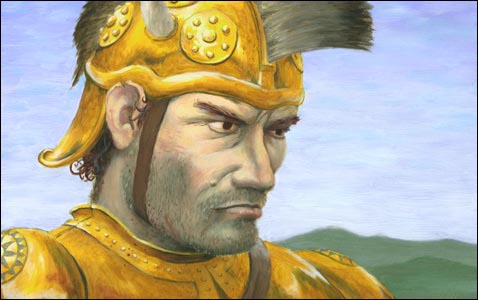|
|

|
|
|

|
|
|

|
|
|
|
Book Seventeen
|
|
|
|
Menelaus (meh-neh-LAY-us) steps forward to guard the corpse of Patroclus (pa-TRAH-klus), to protect it from the Trojans. Euphorbus (yoo-FOR-bus), who had been the first to spear the disarmed Patroclus, challenges Menelaus, eager to claim the downed hero's armor. Menelaus warns Eurphorbus that he has already killed his brother in single combat, but Euphorbus responds that the pain of his brother's wife and parents will be lessened if he can bring them the head and bloody armor of Menelaus. He stabs at the Greek general, but his spearpoint is bent back. Menelaus slays him with a lance to the throat. He begins to strip the armor, but Apollo, adopting mortal guise, convinces Hector to intervene.
|
|
|
|
At the approach of the furious Hector, Menelaus is torn between shame at being seen to abandon the spoils and Patroclus' body, and conviction that he stands no chance single-handed against Hector and his Trojans. He decides that no one will blame him for retreating in the face of one clearly favored by the gods. The prudent course is to go for help, and he seeks out Great Ajax. The two return just in time to find Hector stripping the corpse of Patroclus and about to hack off the head and drag the body away to feed the dogs of Troy. Ajax forces Hector back, but not before Hector hands Patroclus' armor to his men, who carry it away torwards Troy.
|
|
|
|
The Trojan Glaucus (GLAW-kus) taunts Hector into a renewed attack, with the idea that if Patroclus' body can be carried off to Troy it can be exchanged for that of Glaucus' slain commander, Sarpedon (sar-PEE-don). Hector races after the men carrying off Patroclus' armor — the armor of the great Achilles — and he dons it himself. Zeus (zyoos) pities him, knowing that he is soon to die, and fills him with renewed strength. He charges back into battle and promises half the spoils to the Trojan or ally who captures the body of Patroclus. Even Ajax is daunted by his approach and tells Menelaus to call for help. Little Ajax, Idomeneus (eye-DOM-en-yoos), and Meriones (meh-RY-uh-neez) come running. Zeus throws a mist of darkness over the carnage that ensues.
|
|
|
|
Back and forth the battle verges over the body of Patroclus. At length, momentum is swinging against the Trojans when Apollo adopts a mortal form and speaks to Aeneas (ee-NEE-us), assuring him that Zeus himself is on the Trojan side. Aeneas recognizes the god at once and shouts to Hector and the others that success is ensured. But the Greeks mass in a tight formation around Patroclus, and so the enormous tug-of-war continues, as when a crew of tanners form a circle to stretch the hide of a great bull and they tug and strain as the hide goes taut.
|
|
|
|
Watching this, the horses of Achilles stand and weep, unresponsive to the urgings of Automedon (aw-TAH-meh-don), the charioteer who has done his best to drive them after the death of Patroclus. And Zeus pities them, immortal beings consigned to mourn the loss of mortal masters. He fires them up with strength and determination, to save themselves from capture by Hector and carry Automedon safely back to the ships. Off they now charge over the plain at a gallop, and Automedon bravely soldiers on as he rides. But he can't very well fight and drive the team at the same time, so he enlists a comrade to be his driver while he dismounts and fights on foot.
|
|
|
|
Marking this, Hector and Aeneas and a crowd of followers see an opportunity to snatch the glorious prize of Achilles' team. At their approach, Automedon summons the two Ajaxes and Menelaus. He himself is the first to hurl a spear and down a Trojan. He shouts out in exultation that he has eased the pain of Patroclus' ghost. He throws the man's armor onto the chariot and climbs aboard, hands and feet slick with gore.
|
|
|
|
Zeus decides to fire up the Greeks, and he sends Athena (a-THEE-nuh) to speak to Menelaus in the guise of Achilles' aged counselor Phoenix (FEE-nicks). Menelaus responds that he would gladly stand and fight for the corpse of Patroclus if only Athena would grant him strength. The goddess is delighted that hers is the first name that comes to his mind, and she readily complies. Menelaus forthwith spears a Trojan, Apollo goads Hector to retaliate, and Zeus chooses this moment to shake the storm-shield and loose a tremendous peal of thunder, striking fear in the Greeks' hearts. In full retreat now, many are brought down from behind by Hector and his Trojans. Even Idomeneus, who has come to the battle without his chariot, is quick to flee when Meriones' charioteer comes charging to his rescue. The charioteer pays with his life.
|
|
|
|
Ajax wants to send word to Achilles that Patroclus is down, but he can't see a messenger through the battle haze. Zeus hears his prayer and lifts the cloud, and Ajax sends Menelaus to find Antilochus (an-TIL-uh-kus). The latter is overcome with the news, but he dutifully runs off to inform Achilles, not that the great hero is likely to be of any help since Hector has taken his armor. Meanwhile, Menelaus and Meriones pick up the body of Patroclus and carry it toward the Greek camp, with Great Ajax and Little Ajax protecting their backs.
|
|
|

|
|
|

|



